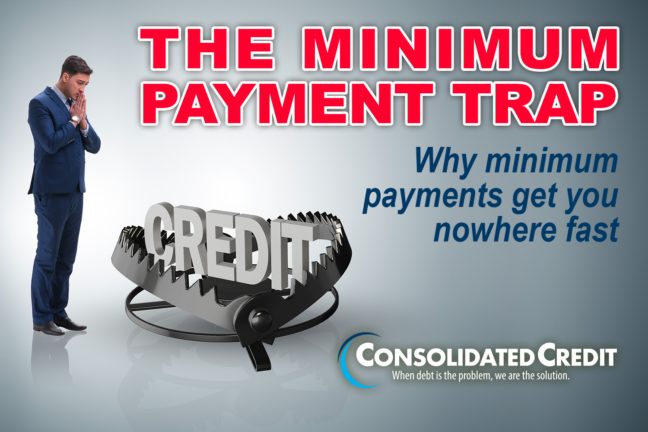Are You Stuck in a Credit Card Minimum Payment Trap?
The minimum payment of a credit card is the lowest amount a cardholder can pay to keep their account current and in good standing. If you aren’t able to pay your balance in full, making minimum payments will prevent your credit score from taking any hits but it can also result in your debts ballooning out of control and costing you a lot more due to what’s known as the credit card minimum payment trap.
Learn more about credit on our How Credit Works page »
What is a credit card minimum payment?
Your credit card statement is filled with numbers which can be confusing whether you’re new to credit or you’ve had credit cards for years. One of the most important numbers on your statement is your minimum payment.
A credit card minimum payment is the absolute minimum the company requires you to pay on your card every month — even if you have a promotional 0% interest rate. Doing so keeps your account in good standing, preventing late fees and other penalties, and allows you to continue using your credit card.
However, paying this amount won’t make much of a dent when it comes to your credit card balance. Minimum payments aren’t designed to help you keep up with your debt.

Why is the minimum payment not helping my debt?
Minimum payments are not set up to help you get out of credit card debt — in fact, they’re often what get people into deep card debt in the first place.
If someone only makes a minimum payment that doesn’t cover their entire balance, they incur interest charges. These charges are then added to the total credit card balance. Continue to pay the minimum amount and the cycle will repeat, resulting in exponentially higher interest charges each month. The problem gets worse as this continues because less and less of the monthly payment covers the principal (the actual amount owed), making it impossible to make a dent.
This is the trap of minimum monthly payments. It’s why so many people find themselves drowning in credit card debt despite making payments every month. Find out how long it would take to pay off your debts with just the minimum payment using the calculator below.
Other credit card minimum payment FAQs
How is credit card minimum payment calculated?
The minimum balance on a credit card depends on who issued your credit card. Some companies use a flat rate while others use a percentage of the statement balance or a combination of the two. The most common credit card minimum payment is $15 or $25 but the minimum payment will increase as the total credit card balance increases.
Can I pay more than my minimum payment?
Yes! You can always pay more than the minimum payment. It’s best to pay your full credit card balance every month to avoid interest charges costing you money, but if you can’t afford the full balance it’s always recommended to pay at least a little more than the minimum.
What if I miss my minimum payment?
If you miss your minimum payment due date, your account will be immediately penalized. Different companies require different late fees, so check your terms to find out how much you will owe.
If 30 days pass and you still haven’t made your minimum payment, your credit card company will report it to the credit bureaus. This missed payment will stay on your credit report for a long time ̶ seven whole years, to be exact. If you keep missing minimum payments, your late fees will pile up and make it even more difficult to pay off your credit card and get out of debt.
How can I avoid missing my credit card minimum payment?
Many credit card issuers allow you to set up text and email reminders. Even easier is setting up automatic payments (autopay) which can be set to pay the full balance, statement balance, a custom amount, or the minimum payment.
I’m having trouble with my credit card minimum payment. What do I do?
Making your payments can be tough, even when you’re using a debt reduction plan. If making minimum payments is getting difficult or paying your credit card debt is too difficult to manage on your own, get a free evaluation from a credit counselor at Consolidated Credit today. We can help you find alternative ways to get out of credit card debt.
Need help with your credit card debt? Get a free evaluation from a certified credit counselor today.
